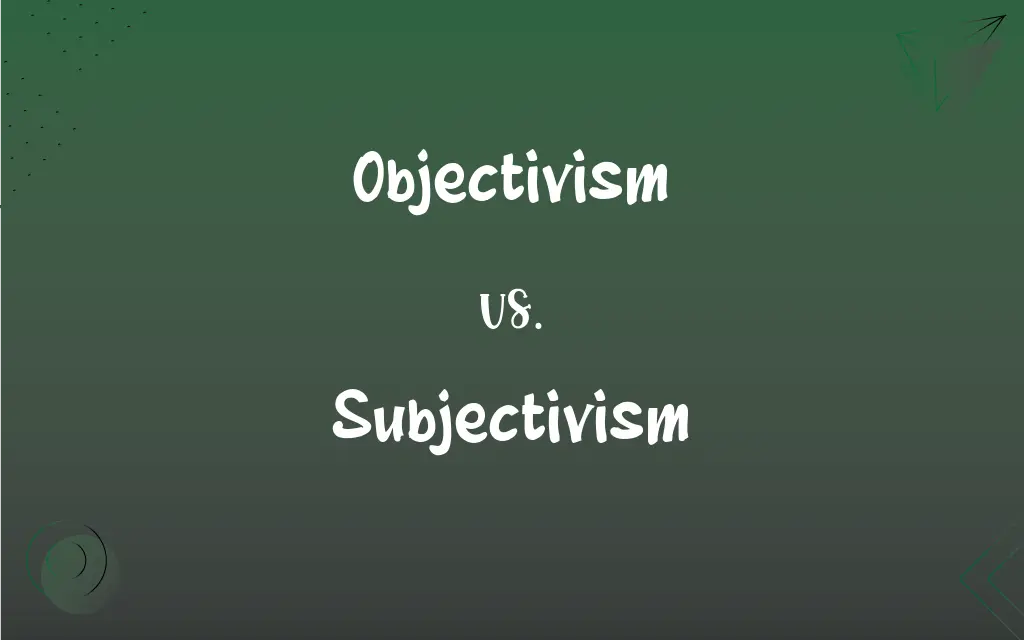Objectivism vs. Subjectivism: What's the Difference?
Edited by Janet White || By Harlon Moss || Updated on November 7, 2023
Objectivism asserts that certain things, especially moral truths, are independent of human feelings, while subjectivism holds that they are dependent on individual beliefs or perspectives.

Key Differences
Objectivism is the philosophical stance that reality exists independently of consciousness, that individuals can gain objective knowledge from perception through the process of concept formation and inductive logic. Subjectivism, in contrast, argues that reality is not absolute but is perceived differently by each individual, influenced by personal feelings, tastes, or opinions. While objectivism strives for impartiality and seeks universal truths, subjectivism emphasizes the variability of perception and the importance of personal experience.
Objectivism asserts that there are universal moral truths that apply to all rational beings and that these truths are discoverable through reason. Subjectivism, however, suggests that moral truths are not universal and can vary from person to person. In objectivism, ethical conduct is derived from the nature of reality and the nature of rational beings within it, leading to principles that apply to everyone. In subjectivism, ethical conduct is more personal and less about universal mandates, often leading to moral relativism where truths are not absolute but contingent upon individual perspectives.
In terms of art and aesthetics, objectivism may argue for certain standards of beauty based on objective assessment of form, harmony, and expression. Subjectivism, on the other hand, holds that beauty is in the eye of the beholder, and that aesthetic value is determined by individual tastes and cultural backgrounds. Objectivism seeks to establish a standard independent of personal feelings, while subjectivism allows for a multitude of standards based on personal preferences.
When discussing knowledge, objectivism supports the idea that it is possible to know things as they truly are, through objective reality and factual evidence. Subjectivism posits that knowledge is inherently limited by the individual's subjective perspective and can never be completely free of bias. Objectivism champions the scientific method as a way to discover objective truth, whereas subjectivism might argue that even scientific findings are interpreted through a subjective lens.
In the realm of ethics, objectivism holds that the best moral action is the one that objectively furthers the actor's life as a rational being, often associated with Ayn Rand's philosophy of rational self-interest. Subjectivism, in ethical discussions, allows that what is moral may vary depending on the individual's desires, cultural norms, or personal situations. Objectivism seeks to find moral principles valid for all people, while subjectivism accepts that different people may have different principles.
ADVERTISEMENT
Comparison Chart
Truth
Believes in absolute truths existing independently of perception.
Holds that truth is relative to the perceiver's beliefs.
Moral Judgments
Moral truths are objective and discoverable through reason.
Moral truths are subjective and personal.
Knowledge
Knowledge of reality is obtainable and verifiable.
Knowledge is influenced by individual perspectives.
Art and Beauty
Standards of beauty are objective and universal.
Beauty is determined by individual tastes.
Ethical Principles
Ethical principles are based on objective reality.
Ethical principles are based on personal or cultural contexts.
ADVERTISEMENT
Objectivism and Subjectivism Definitions
Objectivism
The philosophy that moral truths are universally valid.
She follows objectivism in her ethical decision-making.
Subjectivism
The belief that moral practices and beliefs are expressions of individual or cultural standards.
She defended her actions through subjectivism, saying that morality varies by culture.
Objectivism
The idea that reality exists independently of consciousness.
Objectivism asserts that the laws of physics do not change with our beliefs.
Subjectivism
The idea that beauty is not inherent in objects but is an expression of personal or cultural preferences.
The art critic's subjectivism was evident when he dismissed the popular opinion on the artwork.
Objectivism
The belief in objective reality and knowledge.
His stance on the debate was rooted in objectivism.
Subjectivism
The doctrine that knowledge is merely subjective and that there is no external or objective truth.
His argument was based on subjectivism, highlighting personal experience over empirical evidence.
Objectivism
Ayn Rand's philosophy emphasizing rational self-interest and capitalism.
Objectivism influenced his support for free-market policies.
Subjectivism
The view that reality is not a firm absolute but a fluid, personal interpretation.
His subjectivism led him to believe that everyone has their own version of truth.
Objectivism
The view that emotions should not cloud our perception of reality.
He approached the issue with objectivism, setting aside personal feelings.
Subjectivism
The philosophy that feelings and personal experiences determine individual truths.
Her poetry was filled with subjectivism, emphasizing the importance of personal emotions.
Objectivism
(Philosophy) One of several doctrines holding that all reality is objective and external to the mind and that knowledge is reliably based on observed objects and events.
Subjectivism
The quality of being subjective.
Objectivism
An emphasis on objects rather than feelings or thoughts in literature or art.
Subjectivism
The doctrine that all knowledge is restricted to the conscious self and its sensory states.
FAQs
Is subjectivism considered a scientific approach?
No, subjectivism is not typically scientific because it emphasizes personal perspectives over objective evidence.
What is objectivism in philosophy?
It's the belief that reality exists independently of consciousness and that individuals can obtain objective knowledge.
Can an objectivist believe in subjective experiences?
An objectivist can acknowledge subjective experiences but believes objective truths can be known despite them.
Can objectivism apply to ethics?
Yes, objectivism applies to ethics by asserting universal moral truths based on reason.
Can subjectivism lead to relativism?
Yes, subjectivism can lead to moral relativism, where truths and ethics are not absolute but vary between individuals.
Does subjectivism accept universal moral principles?
No, subjectivism holds that moral principles are subject to individual or cultural viewpoints.
How does subjectivism define truth?
Subjectivism defines truth as relative to the observer's beliefs and experiences.
Is objectivism compatible with religion?
It can be, but objectivism emphasizes knowledge through reason which may conflict with faith-based beliefs.
How does objectivism view capitalism?
Objectivism often supports capitalism as it aligns with individual rights and rational self-interest.
What is the role of emotion in objectivism?
Emotions are recognized in objectivism but are not considered a means to obtain knowledge.
Can objectivism lead to ethical absolutism?
Yes, as it posits that there are definitive ethical truths.
What does objectivism say about art?
Objectivism may argue that there are objective standards for judging art, regardless of individual opinions.
How does subjectivism view the role of consensus in determining truth?
Subjectivism would argue that even consensus does not create an objective truth, only a shared subjective belief.
Can objectivist ethics change over time?
Objectivist ethics are based on unchanging reality, so they are not expected to change over time.
Does subjectivism discount objective reality?
Subjectivism doesn't necessarily deny objective reality, but it prioritizes personal perception in understanding that reality.
How does subjectivism impact cultural understanding?
Subjectivism promotes the idea that cultural understanding is shaped by personal and societal contexts.
Does subjectivism affect the notion of beauty?
Yes, subjectivism suggests that perceptions of beauty are subjective and can vary greatly.
Can a person be an objectivist in some areas and a subjectivist in others?
While uncommon, it's possible for a person to apply objectivist principles in some areas, like science, and subjectivist principles in others, like art.
Are objectivist principles absolute?
Objectivists believe their principles are absolute, applicable to all rational beings.
How might subjectivism influence law?
Subjectivism might influence law by allowing for individual interpretation and application of legal principles.
About Author
Written by
Harlon MossHarlon is a seasoned quality moderator and accomplished content writer for Difference Wiki. An alumnus of the prestigious University of California, he earned his degree in Computer Science. Leveraging his academic background, Harlon brings a meticulous and informed perspective to his work, ensuring content accuracy and excellence.
Edited by
Janet WhiteJanet White has been an esteemed writer and blogger for Difference Wiki. Holding a Master's degree in Science and Medical Journalism from the prestigious Boston University, she has consistently demonstrated her expertise and passion for her field. When she's not immersed in her work, Janet relishes her time exercising, delving into a good book, and cherishing moments with friends and family.































































